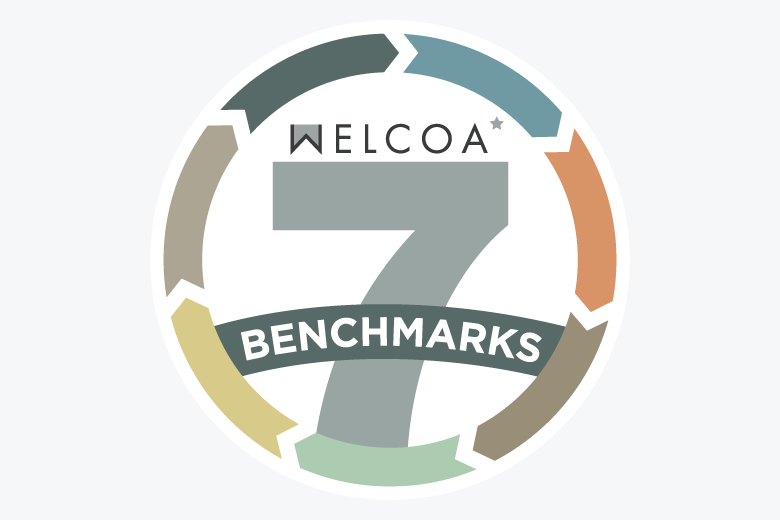It should come as no surprise that the spaces we occupy every day have a huge impact on our overall wellness. The Environmental Protection Agency and Vancouver Coastal Health report that Americans and Canadians spend about 90% of their time indoors. But what about the time we spend outdoors?
Your Welcoa membership has expired.
The 7 Benchmarks Evolution
The second generation of WELCOA’s 7 Benchmarks.
Our industry has an engagement problem. Only 24% of employees in organizations who offer a wellness program actually participate in it.1 We have all begun to face the fact that no one wants to consume the programmatic approach to wellness that our industry has historically offered. WELCOA has partnered with organizations around the globe for over 30 years to understand what works, what doesn’t and develop best practices. Our mission then was the same as our mission now, to help employees be happy, healthy and high performing. As the research evolves and our understanding evolves, we have to evolve.
Over three years of quantitative research and focus groups, we started gaining an understanding of what our Members’ challenges were. From there, we assembled a council of the nation’s leading experts in organizational culture, wellness and employee engagement so that we could take a collaborative approach to solving a problem that impacts us all. Through this research and collaboration, we have come to learn that there are many variables that impact the wellness of individuals that are seldom considered in our approach to employee wellness.
As a result of these efforts, we are thrilled to announce the second generation of WELCOA’s 7 Benchmarks. Just like the first generation of Benchmarks, the evolved seven-step Well Workplace Process is a reflection of years of research, and is an iterative change management process that is relevant for all organizations. We’ve broadened our measurement and tools so that no matter what an organization’s goals are for wellness, we can guide them down a strategic and aligned path to success. Not every organization is interested in cost containment or health risk status migration, so not all organizations need to measure biometric markers. We know incentives don’t drive sustainable change, so programs will no longer be evaluated based on the richness of their incentive model. We needed to create a new process and measurement for thriving organizations and thriving employees.
This is about people. Most people do want to be healthy, and our job is to create the proper conditions to help people be successful. By focusing on biometric markers and applying a strictly medicalized approach, our industry has been ignoring the human behind the number. The true determinants of health are the things that make life rich and human beings thrive. Do we have strong communities? Do we feel a sense of meaning in our work and lives? Do we feel a true calling? Do we feel like we have all of our basic financial needs covered? We have created new ways to measure the intangibles of how an employee interacts with their work environment, because we know that it is the intangibles—though harder to measure—that actually determine how healthy we are.
The new 7 Benchmarks is the beginning of the answer. It will serve as the foundation of a brand-new set of tools that will support the Well Workplace process from evaluation to validation to designation. Our commitment is to continue to provide tools and resources to help organizations take a more holistic approach to employee wellness.
The time has come – the workplaces of tomorrow must be places of health, healing and purpose for all to succeed. Join us in ushering in the future of work.
We’re working furiously to share how these new Benchmarks will be used to reinforce the WELCOA Well Workplace Checklist and Award in the coming months. Stay tuned for updates about how you can interact with these new tools.
1. Gallup U.S. Panel Members
 Ryan Picarella, President
Ryan Picarella, President




